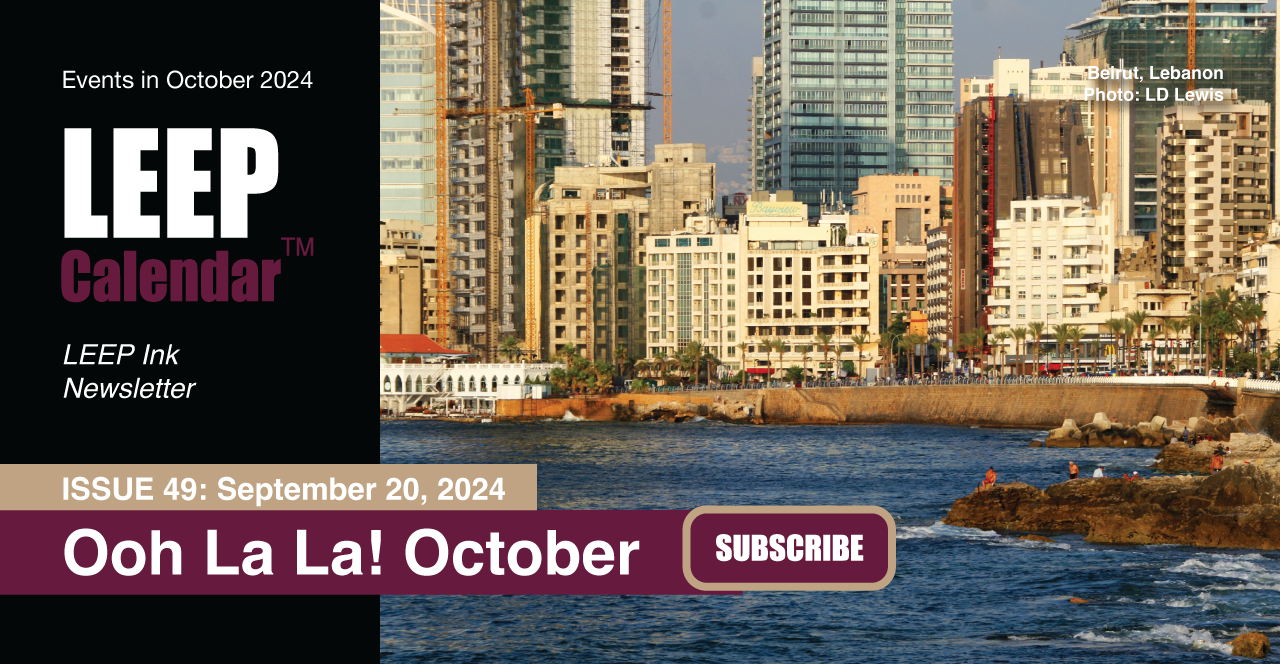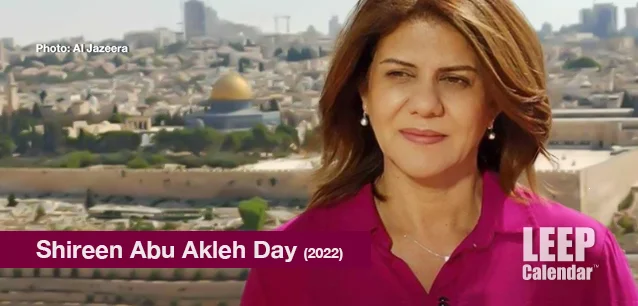 AD
AD
Today is: November 07
Scroll to explore events active on this date.
Additional Events on LEEP
LEEP INK FEATURES

August is Appropos
A toddler playing in the fountain at a park in Santa Fe, New Mexico—Photo LD Lewis. In August, we live through the Dog Days of Summer. It's hot and often humid, and those ...

September is Sassy
Can you hear that sigh of relief from parents worldwide? Yes! September marks the return of students to school, a global phenomenon. Preparations for the ACT and SATs begin earnestly for ...

OOH LA LA, October
October is the busiest month for events, with 5% more happening than in May, the second most eventful month. Sailing enthusiasts will be glued to the finals of this year's Am...
About Shireen Abu Akleh Day
Media , Military
Legal , Civil Rights
Ends: May 11, 2025
DESCRIPTION:
Shireen Abu Akleh Day honors the men and women of the media who have lost their lives in the line of duty and falls on the anniversary of the murder of American and Jordanian Journalist Shireen Abu Akleh by an Israeli Occupation Forces sniper on May 11, 2022
THE DANGERS OF MEDIA WORK
According to Reporters without Borders, an average of 80 journalists and media workers die doing their job each year, with 60% targeted for assassination for doing their job. The remaining 40% die due to unintentional causes, such as mortar shells and dangerous surroundings. Due to the drug cartels, Mexico continues to be the most dangerous country for media workers.
Journalists face various risks and threats while carrying out their work, which is crucial in providing information and holding power to account. Their pursuit of truth and reporting can make them targets for violence, censorship, and intimidation. Here are some of the dangers journalists often face:
Physical Violence: Journalists frequently face physical violence, including assault, kidnapping, and murder. They often find themselves caught in the crossfire of conflicts, covering war zones, political uprisings, or organized crime activities. Journalists are sometimes deliberately targeted due to their investigative work, exposing corruption, human rights abuses, or organized crime networks.
Repression and Censorship: Many journalists face repression and censorship by governments or other powerful entities. Governments may enact laws or regulations to control the media, restrict freedom of expression, or silence dissenting voices. Journalists critical of the authorities often become targets of harassment, legal action, or imprisonment, leading to self-censorship and a chilling effect on investigative reporting.
Online Threats and Harassment: With the rise of digital media, journalists face increasing threats online. They are often harassed, cyberbullied, doxxed (releasing private information), or hacked. Trolling and online abuse can have severe psychological and emotional impacts on journalists, leading to self-censorship or leaving the profession.
Targeting of Journalists in Conflict Zones: Journalists reporting from conflict zones face significant risks. They operate in dangerous environments with active armed groups, insurgents, or military forces. They are vulnerable to being targeted for their reporting, as conflicting parties may perceive them as threats or propaganda agents.
Impunity and Lack of Justice: One of the significant challenges is the high level of impunity surrounding crimes against journalists. Perpetrators often go unpunished, which fosters an environment of fear and further endangers journalists. The lack of justice creates a cycle of violence and intimidation, deterring journalists from pursuing essential stories.
Nonviolent Pressures and Threats: Journalists may face nonviolent pressures such as defamation lawsuits, economic pressures, or threats to their reputations. Influential individuals or corporations may use their power to undermine journalists' credibility and discourage critical reporting.
Lack of Resources and Training: Journalists in many parts of the world work under challenging conditions with limited resources and inadequate training. Insufficient safety equipment, poor infrastructure, and lack of training on risk assessment and conflict reporting further increase their dangers.
The safety and protection of journalists are crucial for upholding press freedom and the right to information. International organizations, NGOs, and press freedom advocates continue to work towards improving safety protocols, advocating for legal protections, and raising awareness about the importance of protecting journalists worldwide.
ABOUT SHIREEN ABU AKLEH
Shireen Abu Akleh was born in Amman, Jordan, in 1965 and held American and Jordanian citizenship. Her reporting significantly influenced Middle Eastern politics and human rights, particularly regarding the Israeli occupation of Palestine.
As a journalist in the Middle East for 25 years, she covered various issues, including politics, human rights, and social issues. She worked for multiple media outlets, including Al Jazeera, where she was one of the first women to work as a field reporter.
In addition to her journalistic work, Abu Akleh has written several books, with "Hussein and Abdullah: Inside the Jordanian Royal Family," an inside look into the Jordanian royal family and the politics of Jordan, as her most widely read.
Abu Akleh spoke out against the Israeli occupation of Palestine and called for a peaceful resolution. She was murdered while covering a story in the Occupied West Bank for Al Jazeera on May 11, 2022, by an Israeli sniper who killed her with a bullet to the head.
VIDEOS
SUPPORTING DOCUMENTS
Currently, this event does not have supporting documents.
ADDITIONAL IMAGES
Currently, this event does not have supporting images.
Where would you like to go now?
 AD
AD


/footer-logo.svg)
